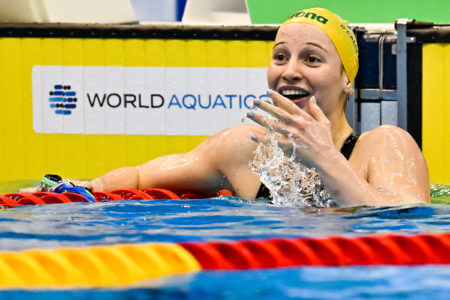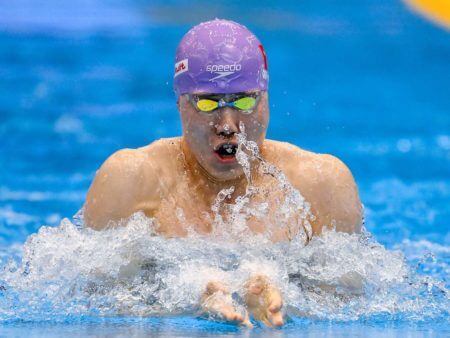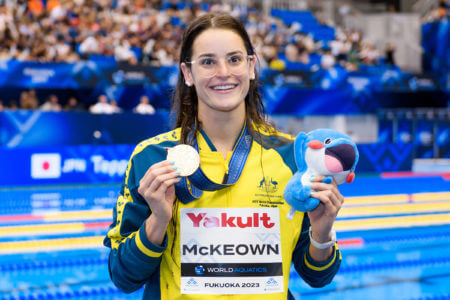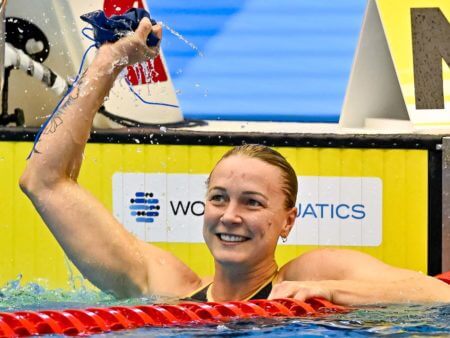Top Performances of 2023: Leon Marchand, Australian Women Shine With World Records
For the first time in more than 20 years, Australia topped the gold-medal count at last year’s World Championships, and the swimmers from Down Under produced some dazzling performances both in individual events and in four relay victories, including world records in the women’s 400 and 800 freestyle relay. It should be no surprise, then, that Australia is responsible for half of the year’s list of top performances, but the No. 1 spot goes to a man who broke the oldest world record on the books.
Several swimmers might have earned multiple spots on this top-10 list, but each individual is eligible to appear on this list just once.
1. Leon Marchand (France), 400 IM at World Championships (4:02.50 WR)
Ever since he first threatened Michael Phelps’ world record in the 400 IM at the 2022 edition of the global meet, swimming fans around the world waited anxiously to see if and when Leon Marchand could topple the last global standard set by the 23-time Olympic champion. It turns out that in the 21-year-old Frenchman’s next opportunity at a major final, he would simply blow away the record.
In the World Championships final, Marchand trailed only after the first length before moving ahead of American rival Carson Foster. Hundredths over world-record pace at the halfway point, that changed dramatically on the breaststroke leg as Marchand clocked 1:07.64 over the two lengths of breaststroke, and he turned for the freestyle in 3:04.28, nearly three seconds quicker than Phelps did at the 2008 Olympics in Beijing. A solid freestyle leg helped Marchand finish in 4:02.50, more than one second quicker than the previous world record.
His week in Fukuoka would also see Marchand join Phelps and Ryan Lochte as the only men to break 1:55 in the 200 IM (they have since been joined by China’s Wang Shun), and Marchand also pulled away to win gold in the 200 butterfly by more than one second. But it was his win in the medley that secured his status as the sport’s male headliner heading into the upcoming Olympic Games in his home country.
2. Mollie O’Callaghan (Australia), 200 Freestyle at World Championships (1:52.85 WR)

Mollie O’Callaghan — Photo Courtesy: Andrea Masini / Deepbluemedia / Insidefoto
Speaking of long-lasting world records, Federica Pellegrini owned the mark in the women’s 200 freestyle for 14 years, ever since the polyurethane suit era of 2009. Plenty of swimmers came close to Pellegrini’s 1:52.98, including Australian Olympic champion Ariarne Titmus, but no one had been able to match Pellegrini’s closing speed as the superimposed world-record line sped ahead. That changed in 2023 as 19-year-old Australian Mollie O’Callaghan somehow came home faster than Pellegrini.
O’Callaghan had won the world title in the 100 free one year earlier by rocketing from eighth at the halfway point to the top spot by the finish. As she made rapid gains in the 200 free following a silver medal in 2022, O’Callaghan followed the same fast-finishing playbook. In the Worlds final last year, Titmus opened up a big lead with 50 meters remaining, with O’Callaghan marginally in second place.
But O’Callaghan had one last surge, catching up to Titmus and then moving ahead with 10 meters remaining. O’Callaghan split 28.11 coming home, seven tenths quicker than anyone else in the field and a half-second ahead of Pellegrini’s pace. Indeed, O’Callaghan shocked the world by sneaking in ahead at 1:52.85, finally erasing Pellegrini from the record books.
3. Ariarne Titmus (Australia), 400 Freestyle at World Championships (3:55.83 WR)
She could not quite hold off O’Callaghan in the 200 free, but Titmus had a golden moment of her own in Fukuoka where she crushed a field considered one of the best in history in the 400 free. Earlier in the year, Summer McIntosh had lowered Titmus’ world record in the event with a time of 3:56.06, and in the final, McIntosh would face Titmus as well as the previous world-record holder and a four-time world champion in the event, American Katie Ledecky.
But even in the face of daunting competition, Titmus left no doubt about her superiority in the event in a nearly-wire-to-wire triumph. McIntosh had broken the world record by blasting the first 200 meters and holding on, but Titmus had a half-second lead over the young Canadian at the halfway point, and the margin was almost one-and-a-half seconds with 100 meters remaining. Ledecky and New Zealand’s Erika Fairweather both passed McIntosh down the stretch, but Titmus was accelerating, with splits of 29.77, 29.61 and then 28.87 to slam the door shut.
By the finish, Titmus had built an advantage of almost three seconds, and her final time was 3:55.38, reclaiming the world record from McIntosh in dramatic fashion.
4. Qin Haiyang (China), 200 Breaststroke at World Championships (2:05.48 WR)

Qin Haiyang — Photo Courtesy: Giorgio Scala / Deepbluemedia / Insidefoto
Having never before qualified for a final at a long course World Championships or Olympics, China’s Qin Haiyang was one of the breakout performers of 2023, becoming the first man to sweep the 50, 100 and 200-meter races of a stroke at a World Championships. After becoming the second-fastest man ever in the 50 and 100 to win gold in those races, albeit in the absence of world-record holder Adam Peaty, Qin topped Olympic champion Zac Stubblety-Cook over 200 meters, lowering the Aussie’s world record in the process.
The 24-year-old Qin showed off his powerful breaststroke in all three distances, and accordingly, he opened up a significant lead over Stubblety-Cook in the final, turning in 1:00.72 and more than one second under world-record pace. Stubblety-Cook tried to make the comeback, splitting slightly quicker than his Chinese rival on the final two lengths, but Qin had too big an edge. Stubblety-Cook finished in a solid time of 2:06.40, quicker than his world-title-winning time from one year earlier, but Qin came in at 2:05.48, taking almost a half-second from the previous global standard.
5. Summer McIntosh (Canada), 400 IM at Canadian Trials (4:25.87 WR)
Her rapid ascendance through the ranks of swimming saw McIntosh win her first world titles at age 15, and by 16, she was a world-record holder. McIntosh grabbed two world marks at the Canadian Trials last spring, first taking away Titmus’ mark in the 400 free (which the Australian would reclaim at Worlds) before also lowering Katinka Hosszu’s world record in the 400 IM. Hosszu’s mark had been considered one of the toughest in swimming, with the Hungarian swimming a time of 4:26.36 to beat the previous mark by more than two seconds at the Rio Olympics, but McIntosh was undaunted.
In her record-breaking swim, McIntosh was more than a second under world-record pace after butterfly and exactly two seconds under after backstroke, giving herself a chance, even with breaststroke, her weakest of the disciplines, upcoming. Eight tenths off pace at the finish of that stroke, McIntosh reasserted herself on freestyle, a closing split of 1:00.56 helping her etch her name in the record books by becoming the first woman ever under 4:26, with a final time of 4:25.87.
6. Kaylee McKeown (Australia), 200 Backstroke at New South Wales State Championships (2:03.14 WR)

Kaylee McKeown — Photo Courtesy: Andrea Masini / Deepbluemedia / Insidefoto
Kaylee McKeown could have made this list for about six different backstroke performances: she swept all three races at the World Championships, becoming the first woman ever to do so in a single stroke, and she broke world records over all three distances last year, taking the marks in the 50 and 100 back at the World Cup in Budapest in October after lowering the mark in the 200 earlier in the year. McKeown gets the nod for the 200-meter performance, in which she knocked off Regan Smith’s four-year-old mark of 2:03.35 — four months before she would beat Smith for world titles in three different races.
McKeown has finishing speed that is the envy of all backstrokers, and that’s how she secured the record in the 200 back at the relatively-low-stakes New South Wales State Championships in March. McKeown was out in 1:00.73, more than three tenths slower than record pace, but by the final turn, she turned equal with Smith’s 2019 pace. McKeown would close in 31.30 for a final time of 2:03.14. She would not lower that time any further in 2023, but she now enters the Olympic year within striking distance of a 2:02.
7. Ahmed Hafnaoui (Tunisia) & Bobby Finke (USA), 1500 Freestyle at World Championships (14:31.54/14:31.59)
In one of history’s all-time great distance races, Tunisia’s Ahmed Hafnaoui and American Bobby Finke went head-to-head for 30 lengths in Fukuoka with neither man ever gaining a clear edge. The two men took over the lead from Australia’s Sam Short with 500 meters to go, and from there, the margin between the two at each turn remained around two tenths. Hafnaoui was three tenths ahead with 100 meters remaining, but Finke would not give up.
Down the stretch, Hafnaoui and Finke laid everything on their line, both refusing to yield. By the finish, a measly five hundredths separated the two men, with Hafnaoui swimming the second-fastest time ever at 14:31.54 and Finke going the third-best time ever at 14:31.59. Both men obliterated their best times.
An honorable mention should also be reserved for Short, who came out on top in a similarly-nail-biting result in the 400 free, beating Hafnaoui by two hundredths with both men entering the all-time top-five in the event.
8. Sarah Sjostrom (Sweden), 50 Butterfly (24.77) + 50 Freestyle Semifinal (23.61 WR) at World Championships

Sarah Sjostrom — Photo Courtesy: Andrea / Deepbluemedia / Insidefoto
A world champion at age 15 and now a world champion at age 29, Sarah Sjostrom won her fifth straight global honor in the 50 fly, becoming only the second woman to five-peat in an event, and unwilling to be content with the gold medal, the 11th individual world title of her remarkable career, Sjostrom returned to the blocks 19 minutes later for the 50 free semifinals — and she lowered her own world record.
Sjostrom touched in 23.61 to beat her six-year-old mark by six hundredths. One day later, Sjostrom beat the field in the final by almost a half-second, a huge margin in the splash-and-dash, as she finished just one hundredth off her new record for world title No. 12 and her third in the 50 free.
9. Cameron McEvoy (Australia), 50 Freestyle at World Championships (21.06)
This 29-year-old Australian pulled off a comeback that can best be described as improbable. Cameron McEvoy had last competed internationally at the Tokyo Olympics, where he did not advance out of prelims in any event (although he did earn bronze as a relay alternate). But in his return to the sport, he focused only on 50-meter races and blasted his way to his first career world title.
McEvoy, whose only previous individual medal at a major competition had been 100 free silver eight years earlier in Kazan, demolished the field in the 50 free by more than a half-second. He swam a time of 21.06 to beat a 14-year-old Australian record (Ashley Callus, 21.19) and become the fourth-fastest man in history, trailing only Cesar Cielo, Fred Bousquet and Caeleb Dressel.
10. Kyle Chalmers (Australia), 400 Freestyle Relay at World Championships (46.56)
Kyle Chalmers could have earned a top performance nod for his 100 freestyle finals swim, where he clocked 47.15 to earn the individual world title that had long eluded the 25-year-old Aussie veteran. But instead, let’s acknowledge Chalmers’ mighty relay abilities. He took part in four relays in Fukuoka and helped all of them to medals, but most impressive was his split on the Aussie men’s 400 free relay, which earned gold at a major meet for the first time since 2011.
The Australians were in third place as Chalmers took over for anchor duties, with Italy and the United States ahead. Italy had 100 back world champion Thomas Ceccon anchoring while rookie Matt King proved to be an able force for the Americans, but neither was a match for Chalmers, who split a sizzling 46.56 for the quickest mark of the race. Chalmers was still behind Ceccon going into the final 50, but the Italian was no match for Chalmers’ 24.27 closing split that secured Australian gold.





